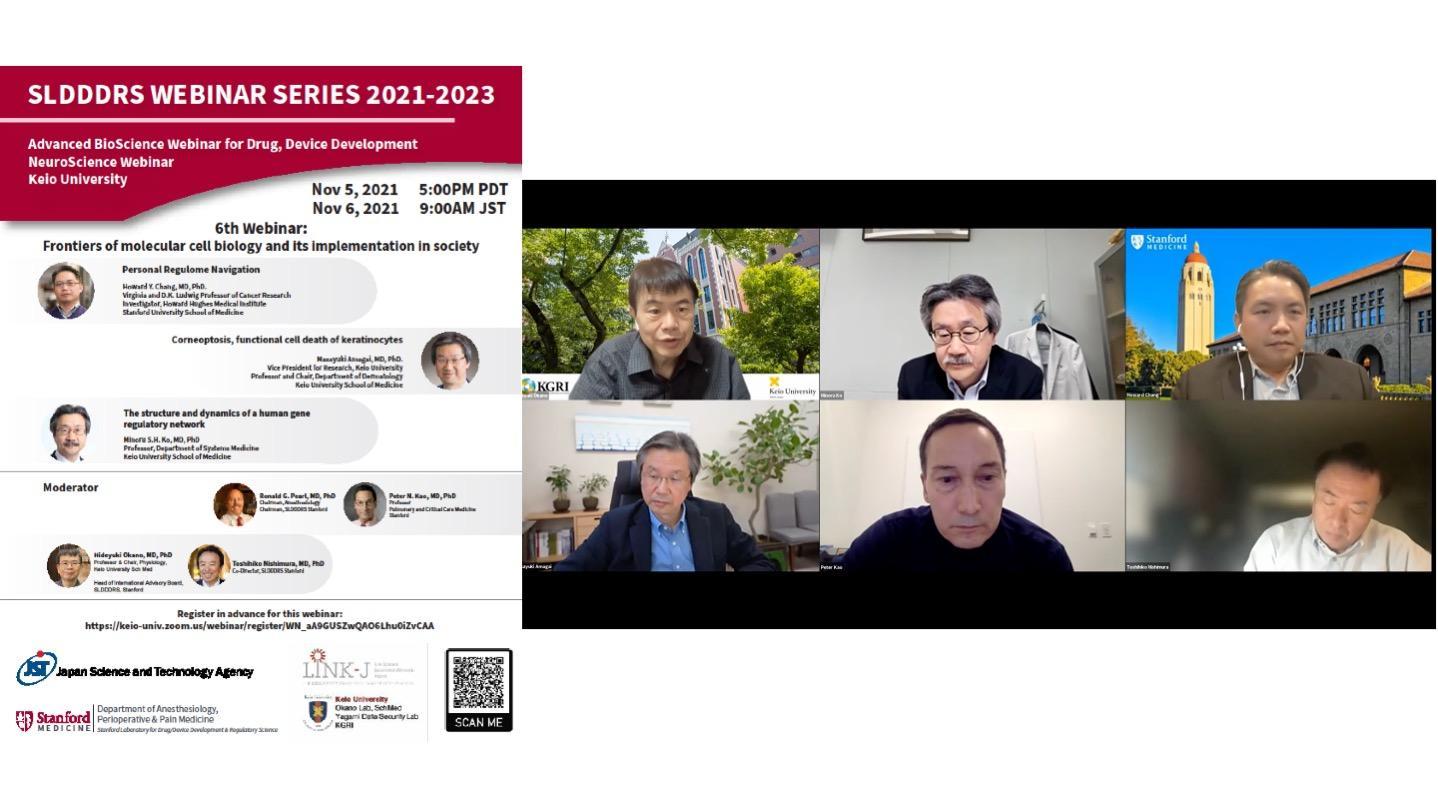[Event report] 6th Keio-Stanford Webinar (held on November 6, 2021)
2021.11.22The 6th Keio-Stanford Webinar was held on Saturday, November 6, 2021. The theme of the event was "Frontiers of molecular cell biology and its implementation in society," with the Department of Anesthesiology, Perioperative and Pain Medicine (SLDDDRS) at Stanford School of Medicine; and the Department of Physiology, School of Medicine and Yagami Data Security Lab at Keio University, acting as hosts, while KGRI; the Life Science Innovation Network Japan (LINK-J); and the Japan Science and Technology Agency (JST) served as co-hosts. Approximately 100 people joined the webinar, which ran for an hour and a half, delving deep into the topic at hand.
The event began with opening remarks from Professor Hideyuki Okano (Department of Physiology, Keio University School of Medicine; Head of International Advisory Board of the SLDDDRS), touching upon the significance of the Keio-Stanford Webinar series and offering an explanation of the main topic for this event: Frontiers of molecular cell biology and its implementation in society.
The event then continued with lectures from three professors.
For Keynote Speech 1, Dr. Howard Y. Chang, a Virginia and D.K. Ludwig Professor of Cancer Research, delivered a lecture on personal regulome navigation. Dr. Chang began by talking about the function of long-noncoding RNAs (IncRNAs), epigenomic profiling, and ATAC-seq (Assay for Transposase-Accessible Chromatin using sequencing) in the regulation of gene expression.
He then touched upon the uncertainty that surrounded whether the response of T cells to PD-1 inhibitors (inhibitory receptors expressed on the surface of T cells after they have been activated) was dependent upon the reactivation of existing tumor-infiltrating lymphocytes (TILs), or rather upon the recruitment of new T-cell receptors. He reported that, as a result of running pair sequencing of single-cell RNA (scRNA) and T-cell receptors (TCR) in samples before and after anti-PD-1 therapy for basal cell carcinoma, the response of T cells to PD-1 inhibition was in fact derived from a different collection of T-cell clones immediately following the infiltration of tumors.
Dr. Chang also shared on the topic of chimeric antigen receptor (CAR) T cells. He explained that, while CAR T cells mediate antitumor effects, loss of function when these cells become exhausted is an issue, revealing that CAR T cell exhaustion is hindered by the disabling of exhausted human T cells with defunct c-Jun, as well as through the overexpression of c-Jun in CAR T cells.
Dr. Chang also broached the topic of neurotoxicity in immunotherapy, discussing the important role played by CD19 expressed in cells that protect the blood-brain barrier in humans. His content-filled lecture also explored clinical trials for cancer immunotherapies that utilize CRISPR-Cas9 technology.
For Keynote Speech 2, Dr. Masayuki Amagai, the Vice-President of Keio University and a professor from the Department of Dermatology at the Faculty of Medicine, spoke about corneoptosis, or the functional death of keratinocytes that occurs during the formation of the stratum corneum.
In order for the stratum corneum to form certain organelles must disappear, the cell nucleus enucleating and the mitochondria fragmenting, but the details of how they do this were previously unknown. Dr. Amagai explained that corneotosis is the third cutaneous epidermal cell death required in the formation of the stratum corneum, following necrosis and apoptosis. During the process of granular layer cell death within the stratum corneum, Ca2+ concentration remains high as intracellular acidification occurs, which causes the nucleus to disappear. He explained that TRPV3, which is a temperature-sensitive calcium channel, is used to regulate this process.
For Keynote Speech 3, Dr. Minoru Ko, a professor from the Department of Systems Medicine at the School of Medicine, gave a lecture on the structure and dynamics of a human gene regulatory network, addressing the large-scale analysis of transcription factors in the human genome.
Transcription factors are known to play a decisive role in cell fate. Dr. Ko previously created a tetracycline-controlled mouse embryonic stem cell line, and revealed that the transcription factor Cdx2 is responsible for the most widespread transcriptome changes. Since then, Dr. Ko's research has grown in scale to involve studies utilizing human embryonic stem cells (hESCs).
In this research he gathered 20 to 30% of the transcription factors present in the human genome, and performed a large-scale analysis to estimate the function of hESCs in determining the cell fate of the 714 genes that they primarily comprise. The results Dr. Ko shared are the outcome of a large-scale study in which a total of 2,135 hESC lines were established from hESCs into which the 714 genes were introduced. For 511 genes, when transcriptome data was analyzed 48 hours after introduction, almost all genes present in the genome were regulated by the induced 511 genes and the genes present in heterochromatin. Interestingly, the expression of genes located in heterochromatin were also induced by specific transcription factors. Dr. Ko also presented unpublished data and, with the first comprehensive analysis of transcription factors, raised expectations for further elucidation of the molecular mechanisms that determine cell fate.
A Q&A session was also held with lively exchanges of questions and answers from the panelists and audience ensuing.
Professor Hideyuki Okano and Professor Peter Kao (Stanford University School of Medicine, SLDDDRS) delivered the closing remarks and summarized the webinar. The event came to a close with an expression of hope that face-to-face conferences will resume in the future.

[Event information]
6th Keio-Stanford Webinar (November 6, 2021)
[Event report]
1st Keio-Stanford Webinar "Neurodegenerative diseases" (held on January 30, 2021)
2nd Keio-Stanford Webinar "Organoids" (held on March 20, 2021)
3rd Keio-Stanford Webinar "Regenerative medicine" (held on May 29, 2021)
4th Keio-Stanford Webinar "Sleep" (held on July 17, 2021)
5th Keio-Stanford Webinar "Transdifferentiation by Manipulating Transcriptional Factors" (held on October 16, 2021)





